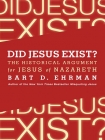Did Jesus Exist? - The Historical Argument for Jesus of Nazareth Bart Ehrman (books to read in your 20s txt) 📖

- Author: Bart Ehrman
Book online «Did Jesus Exist? - The Historical Argument for Jesus of Nazareth Bart Ehrman (books to read in your 20s txt) 📖». Author Bart Ehrman
As indicated earlier, the mythicist G. A. Wells argues that the sayings of Jesus in Paul’s writings were given to him not from the traditions about the teachings of the historical Jesus but from prophecies delivered in Paul’s churches, direct revelations from the Lord of heaven. In some instances that may indeed have been the case, and this passage in 1 Thessalonians may be one example of it. The reason for thinking so is that we do not have any record of the historical Jesus saying any such thing about what would happen at his return (though see Matthew 24:3–44). So there are two choices here: either Paul knew of a tradition in which the historical Jesus allegedly did discuss this matter or he learned this teaching through a prophecy in one of his churches.
At the end of the day I think it is impossible to decide between these two options. Jesus no doubt said lots of things—hundreds of things, thousands of things—that are not recorded in the early Gospels. Later many, many other things were attributed to Jesus that he probably did not say (for example, many of the sayings in the Gospel of Thomas and later Gospels). Paul may well have heard of sayings of Jesus, such as the one in 1 Thessalonians, that no longer survive otherwise (whether they are sayings Jesus actually said or not). Or he may have learned this information about the second coming from a prophecy. But here we are in a different category from the other sayings of Jesus in Paul’s letters that we considered earlier. When Paul claims that the Lord said something, and we have a record of Jesus saying almost exactly that, it is surely most reasonable to conclude that Paul is referring to something that he believed Jesus actually said.16
Provisional Summary: Paul and Jesus
In sum, Paul does indeed show that he knew Jesus existed, and he reveals that he had at least some information about his life. Mythicists as a rule do not accept any of this information as being relevant to the question of whether Paul actually knew or believed there was a historical Jesus. I will give several of their most common arguments in a moment. Before doing so I want to stress several points by way of summary of what we have seen so far about Paul’s view of the historical Jesus.
Paul obviously did not write a Gospel about Jesus, and he did not include enormous numbers of traditions about Jesus in his writings. This strikes many readers of the New Testament as odd. Why doesn’t Paul tell us more about Jesus? You would think it would matter to him. I will address this question at greater length later, as it is one of the points insisted on by many mythicists, who think that if Paul had known there was a historical Jesus, he would have told us a lot more about him. At this stage I want to emphasize two things. The first is that we have to remember that the writings we have from Paul were letters that he directed to his churches (and to the church of Rome, which he did not found). He is writing these letters to deal with problems that had arisen in them. His letters are not meant to spell out everything that he knew or thought about God, Christ, the Spirit, the church, the human condition, and so forth. He addressed problems that his churches were facing. I myself have written hundreds of letters dealing with religious issues over the past thirty-five years. It would be, oh, so easy to collect seven of these letters and not find a single saying of Jesus quoted or a single reference to anything he is thought to have done or experienced. Does that mean I don’t know that Jesus existed?
My second point is that what Paul does tell us makes it very clear that he knew or at least believed that Jesus had lived as a historical person some years earlier. Paul mentions that Jesus was born; that he was a Jew, a direct descendant of King David; that he had brothers, one of them named James; that he had a ministry to Jews; that he had twelve disciples; that he was a teacher; that he anticipated his own death; that he had the Last Supper on the night he was handed over; that he was killed at the instigation of Jews in Judea; and that he died by crucifixion. He also refers on several occasions to Jesus’s teachings. Paul certainly knew that Jesus existed, and he knew some things about him.
I should stress in addition that Paul indicates on several occasions that the traditions about Jesus are ones that he himself inherited from those who came before him. This is clearly implied when he says that he “handed over” what he had earlier “received,” technical language in antiquity for passing on traditions and teachings among Jewish rabbis. Even where Paul does not state that he is handing on received tradition, there are places where it is clear he is doing so. I have mentioned, for example, Romans 1:3–4, an ancient adoptionistic creed about Jesus that indicates he “became” the son of God only when he was raised from the dead. This creed was not written by Paul: it





Comments (0)